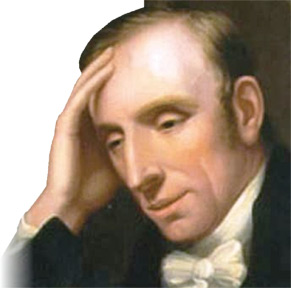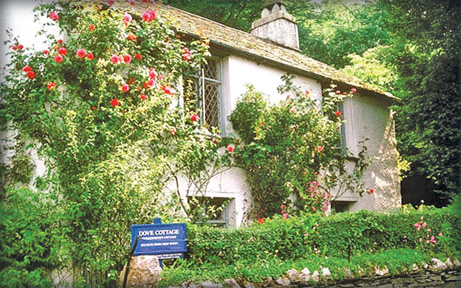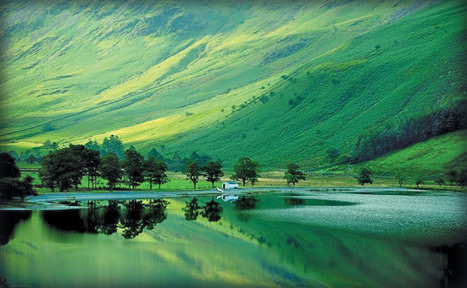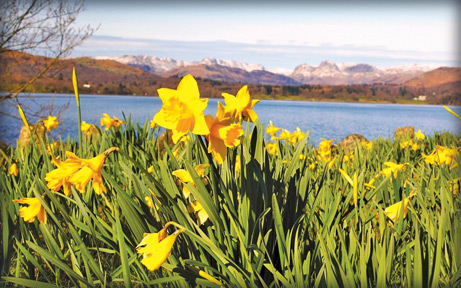|

William Wordsworth |
William Wordsworth:
The nature poet
by W.T.J.S. Kaviratne Ambalangoda Spl. Cor.
William Wordsworth was the Poet Laureate of England from 1843 till
his death in 1850. He had composed 227 poems and in 1798 together with
Samuel Taylor Coleridge published the first edition of Lyrical Ballads.
Wordsworth compiled some experimental poems in simple language such
as ‘I wandered lonely as a cloud’, ‘I travelled among the untrodden
ways’,‘ Three years she grew in sun and shower’ , ‘ She dwelt among
untrodden ways’ and ‘A slumber did my spirit sealed. (Lucy Poems in
1799)
In addition ‘A few Miles Above Tintern Abbey ’also known as Tintern
Abbey Revisited (1798), ‘Solitary Reaper’ and ‘Ode Intimation from
Recollection of Early Childhood (1802)’ are some of the most popular
poems composed by Wordsworth.
‘The Prelude ’(1805) is an autobiographical poem of Wordsworth
comprising of 13 books based on his childhood, time spent in Cambridge,
early travels ,walking tours in France, Switzerland, Italy and Germany.
In ‘The Prelude’ Wordsworth examines his doctrine on memory and his own
poetical career as a tale of rise and fall of his personal memory.
There are references to the enchanting nature’s scenic beauty of the
Lake District and his mystical powers of imagination and poetic genius.
Lyrical ballads
Lyrical Ballads made a great revolution in the sphere of poetry and
challenged the then prevalent traditions of style, diction and the
subject matter.
As one of the leading architects and proponents of the Romantic
Movement of Literature in England Wordsworth in his preface to Lyrical
Ballad defined poetry as ‘The spontaneous overflow of powerful feelings.
It takes its origin from emotions recollected in tranquillity.’
In addition, Wordsworth believed that memory and imagination had to
be exploited with the emotions mingled with the past experiences of the
poet.
Memory plays an active role in the mind of the poet who synthesises
his past experiences in compiling rapturous poems.
|

Dove Cottage where Wordsworth lived |
He had also revealed that memory had played a crucial role even in
his creative process.
Romantic poet
Philosophical treatises of the proponents of Romanticism such as Jean
Jacques Rousseau, Johann Wolfgang von Goethe, Joseph von Schelling,
George Wilhelm and Frieidrich Hegal had profound influence on the
thinking of Wordsworth in his literary career as a Romantic poet.
A closer analysis of poems compiled by Wordsworth reveals the
dominant roles played by memory, recollection and reminiscences in the
imagination of nature.
Wordsworth depicted the unique and mystic nature and powers of human
mind and memory which he believed are inseparable from human
imagination.
The majority of Wordsworth’s poems explicitly convey the message that
he enjoyed the unspoilt serene beauty of nature by recollecting or
reminiscing the past experience of it whenever he was lonely or in a
pensive mood.
In the‘ Ode to Intimation of Immortality’ Wordsworth convey his
belief that children could enjoy the beauty of nature because they are
divine and immortal but this ability undergoes a massive transition when
they reach maturity.
Ode
In ‘Ode to Intimation of Immortality’ Wordsworth reminisces his past
visions and intimate experiences of his own childhood with ‘meadow’,
‘grove’, ‘stream’, ‘earth’, ‘ celestial light’ , ‘rainbow , ‘stars’, and
‘sunshine’.
‘There was a time when meadow, grove streams, the earth and every
common sight to me did seem Apparelled in celestial light.
The glory and the freshness of a dream .
It is not now as it hath been of yore, Turn wheresoe’er I may,
By night or day, The things which I have seen I now can see no more.
|

A scene from the Lake District |
Wordsworth laments in a way in Ode that the things he had seen during
his childhood he had failed to see now.
But he strongly believed that through the inherent unique powers of
human memory, recollection and imagination, even the adults would be
able to re-establish the sacred connection and communion with nature
which they enjoyed during their childhood.
But his childhood memories of nature in its full glory could be
recollected and for the feeling of emotional comfort he derived.
Wordsworth proved to be grateful for both nature and his memory. ‘Ode
to Intimation of Immortality from Recollection of Early Childhood ’ as
the title of the poem suggests that it is based on memory and compiled
on a common theme found in his poems of memory and reminiscence.
Replacing the traditional tenets of Neoclassicism relevant to arts,
music and literature such as grandeur, austerity, nobility idealisation
and elevated sentiments Romanticism resorted to simple, down-to-earth
and natural forms of expression to convey the strong feelings and
imagination.
Wordsworth as a staunch adherent of Romanticism and a follower of
Jean Jacques Rousseau and his philosophy paid greater attention on the
middle and lower classes of society.
His diction and imagery in his poems on nature are simple and easy to
understand. His message was based on the divine blessings and sacred
pleasure the humanity could derive through the communion of nature.
Wordsworth highlights two of the most striking features of his poems,
the‘ effects of nature’ and the‘ role played by memory’ in his famous
poem:
Daffodils:
‘I wandered lonely as a cloud
That floats on high o’er vales and hills,
When all at once I saw a crowd, A host of golden daffodils
The Poet’s loneliness and how happy he was of the memory of the
experience of daffodils was Conveyed:
‘For oft, when on my couch I lie,
In vacant or in pensive mood,
They flash upon that inward eye
Which is the bliss of solitude.’
|

Daffodils |
Memory and recollection of nature’s beauty had provided bliss of
solitude to Wordsworth in his poem‘ I wandered lonely as a cloud.’
Tintern Abbey
‘A few Miles Above Tintern Abbey’ (Tintern Abbey Revisited) is the
last poem of Lyrical Ballads written in July 1798.
He had made his second visit to the area accompanied by his beloved
sister Dorothy.
Wordsworth described the enchanting natural beauty of an area a few
miles above the ancient Abbey.
His past images of steep and lofty cliffs, wild secluded scenery,
quiet of the sky, mountain springs, dark sycamore, hedge-rows, woods and
caves and all these symbols of nature he had recollected in his memory
had been described in a lively manner in his poem Tintern Abbey
Revisited.
Wordsworth describes the inner pleasure he derived from reminiscing
the natural beauty of nature a few miles above the Tintern Abbey.
Wordsworth was constantly hypnotised by the beauty of nature and the
memory of past experiences of nature could bring him to ecstasies as
revealed by his poetry.
According to Wordsworth, memories of the scenic beauty of nature
remained alive in the memory of all of us and whenever we are sad or
disappointed we can take refuge in memories in obtaining emotional and
spiritual comfort.
Many of his poems begin in a melancholic or depressed mood as he was
sad at the loss of innocence and the simplicity of humanity and the
negative attitude towards the beauty of nature spoilt by the influence
of modernism and industrialisation.
But in the same poems he conveys the message that memory finally
provides the solace and comes to the rescue of the humanity.
When Wordsworth visited the area of Tintern Abbey for the second time
just after five years he had a feeling of nostalgia but he resorted to
past memories he gathered five years ago and enjoyed the beauty of
nature.
Just after having a vision of a natural scenic beauty of a place
powerful emotions gathered in the mind of a poet.
The emotions gathered over the years will be retained in the mind of
the poet sometimes for a considerable period just as experienced by
Wordsworth throughout his poetic career and recollected past memories
and emotions are used as raw material in tranquillity in compiling
poems. |

